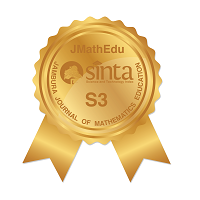Hubungan Antara Self Regulated Learning dengan Hasil Belajar Matematika Pada Materi Trigonometri
Abstract
This article discusses the survey research aims to find out the Correlation between self-regulated learning and students' mathematics learning outcomes in the topic of trigonometry in SMA Negeri 1 Gorontalo. This study focuses on 32 eleventh-grade students in the site area during the academic year of 2018/2019. Moreover, a multiple-choice test was used to collect the data on mathematics learning outcomes, as well as a questionnaire to collect data on self-regulated learning. The hypothesis was tested using the regression and correlational analysis test. The result indicates that self-regulated learning positively correlates with students' mathematics learning outcomes with the correlational and determination coefficient values of 0.6311 and 40%, respectively. In other words, such a learning model contributes 40% to mathematics learning outcomes; the remaining 60% is influenced by other factors excluded in this research.
Keywords
Full Text:
PDFReferences
A. Prabowo and P. Sidi, "Memahat karakter melalui pembelajaran matematika" in Proceeding of The 4th International Conference on Teacher Education: Join Conference UPI & UPSI Bandung, 2010, vol. 4, pp. 165-177.
B. Mahirah, "Evaluasi belajar peserta didik (siswa)" Idaarah J. Manaj. Pendidik., vol. 1, no. 2, 2017.
S. Maâ, "Telaah Teoritis: Apa Itu Belajar?" Help. J. Bimbing. dan Konseling, vol. 35, no. 1, pp. 31-46, 2018.
M. A. van Houten"Schat, J. J. Berkhout, N. van Dijk, M. D. Endedijk, A. D. C. Jaarsma, and A. D. Diemers, "Self"regulated learning in the clinical context: a systematic review" Med. Educ., vol. 52, no. 10, pp. 1008-1015, 2018.
J. Wong, M. Baars, D. Davis, T. Van Der Zee, G.-J. Houben, and F. Paas, "Supporting self-regulated learning in online learning environments and MOOCs: A systematic review" Int. J. Human-Computer Interact., vol. 35, no. 4-5, pp. 356-373, 2019.
B. Chaudhary, Motivational and Self Regulated Learning of Creative Students. Book Bazooka, 2018.
E. Latipah, "Strategi self regulated learning dan prestasi belajar: kajian meta analisis" J. Psikol., vol. 37, no. 1, pp. 110-129, 2010.
A. Mukhid, "Strategi self-regulated learning (perspektif teoritik)" TADRIS J. Pendidik. Islam, vol. 3, no. 2, 2008.
P. Saraswati, "Strategi Self regulated learning dan prokrastinasi akademik terhadap prestasi akademik" Intuisi, vol. 9, no. 3, pp. 210-223, 2017.
M. I. Ulum, "Strategi self-regulated learning untuk menurunkan tingkat prokrastinasi akademik siswa" Psympathic J. Ilm. Psikol., vol. 3, no. 2, pp. 153-170, 2016.
A. Afandy and F. Fuat, "Upaya Mereduksi Prokrastinasi Akademik Pada Tugas Matematika Selama Pandemi Covid-19 Melalui Strategi Self Regulated Learning" Briliant J. Ris. dan Konseptual, vol. 6, no. 2, pp. 398-409, 2021.
S. Handayani, "Pengaruh Antara Self Efficacy Dan Self Regulated Learning Terhadap Prestasi Belajar Mahasiswa Selama Pembelajaran Daring" Edukatif J. Ilmu Pendidik., vol. 3, no. 4, pp. 1373-1382, 2021.
H. Helsa and K. R. Lidiawati, "Online Learning During Covid 19 Pandemic: How Self-Regulated Learning Strategies Affect Student Engagement?" Psibernetika, vol. 14, no. 1, 2021.
E. S. Nasution, "The Role of Self-Regulated Learning in Distance Learning (PJJ) During The Covid-19 Pandemic" Duconomics Sci-meet (Education Econ. Sci. Meet), vol. 1, pp. 389-394, 2021.
E. Rahmawati and F. M. Alaydrus, "Pengaruh Self Regulated Learning terhadap Kemampuan Berpikir Kritis dalam Pembelajaran Blended Learning" Al-Hikmah J. Kependidikan Dan Syariah, vol. 9, no. 1, pp. 122-129, 2021.
R. Meiliati, M. Darwis, and A. Asdar, "Pengaruh Motivasi Belajar, Self Efficacy, dan Self Regulated Learning Terhadap Hasil Belajar Matematika" Issues Math. Educ., vol. 2, no. 1, pp. 83-91, 2018.
D. Kurnia and A. Warmi, "Analisis Self-Regulated Learning dalam Pembelajaran Matematika pada Siswa SMP Kelas VIII Ditinjau dari Fase-fase Self-Regulated Learning" Pros. Sesiomadika, vol. 2, no. 1b, 2020.
F. Febriyanti and A. I. Imami, "Analisis Self-Regulated Learning dalam Pembelajaran Matematika Pada Siswa SMP" J. Ilm. Soulmath J. Edukasi Pendidik. Mat., vol. 9, no. 1, pp. 1-10, 2021.
R. Riduwan, "Metode dan Teknik Menyusun Proposal Penelitian", Bandung: Alfabeta, 2010.
S. S. Fasikhah and S. Fatimah, "Self-regulated learning (SRL) dalam meningkatkan prestasi akademik pada mahasiswa" J. Ilm. Psikol. Terap., vol. 1, no. 1, pp. 145-155, 2013.
B. Chaudhary, Motivational and Self Regulated Learning of Creative Students. Book Bazooka, 2018.
DOI: https://doi.org/10.34312/jmathedu.v3i1.12423
Refbacks
- There are currently no refbacks.
Copyright (c) 2022 Jambura Journal of Mathematics Education

This work is licensed under a Creative Commons Attribution-NonCommercial 4.0 International License.
Jambura Journal of Mathematics Education has been indexed by:
EDITORIAL OFFICE OF JAMBURA JOURNAL OF MATHEMATICS EDUCATION |
 | Department of Mathematics, Universitas Negeri Gorontalo Jl. Prof. Dr. Ing. B. J. Habibie, Moutong, Tilongkabila, Kabupaten Bone Bolango, Gorontalo 96554, Indonesia |
 | Email: [email protected] |
 | +6285255745923 (Call/SMS/WA) |
 | Jambura Journal of Mathematics Education (JMathEdu | eISSN: 2721-7477) by Department of Mathematics Universitas Negeri Gorontalo is licensed under a Creative Commons Attribution-NonCommercial 4.0 International License. Powered by Public Knowledge Project OJS. |



















